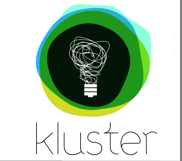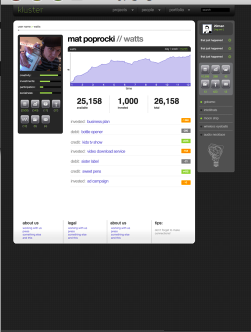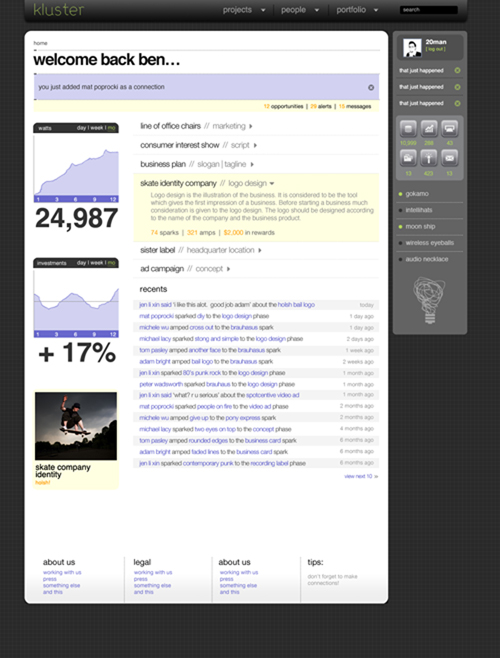 Crowdsourcing may work for Wikipedia, but few commercial companies have figured out how to make it work for them. The basic concept is to get outsiders, preferably customers, to swarm together to design a product or complete some other project. Crowdsourcing is quickly becoming a crowded field—there’s Innocentive, Cambrian House, the soon-to-launch CrowdSpirit, and Ideablob, to name a few sites. But Ben Kaufman, the CEO of a startup from Burlington, Vermont called Kluster, thinks that what is missing are market-like incentives to motivate contributors and push the best ideas forward.
Crowdsourcing may work for Wikipedia, but few commercial companies have figured out how to make it work for them. The basic concept is to get outsiders, preferably customers, to swarm together to design a product or complete some other project. Crowdsourcing is quickly becoming a crowded field—there’s Innocentive, Cambrian House, the soon-to-launch CrowdSpirit, and Ideablob, to name a few sites. But Ben Kaufman, the CEO of a startup from Burlington, Vermont called Kluster, thinks that what is missing are market-like incentives to motivate contributors and push the best ideas forward.
Kluster, which is supposed to launch later today in a public beta (Update 2/19: the site just went live a day late) and will be used by attendees at next week’s TED conference, is designed so that companies can offer cash rewards for each phase of a project. Participants who back the winning idea get to share the reward. Projects can range from creating logos and marketing campaigns to designing a product.
 Participants start off with points, or “Watts,” that they can invest in different projects. Explains Kaufman:
Participants start off with points, or “Watts,” that they can invest in different projects. Explains Kaufman:
Our Watt system is like a currency. You get a certain amount of Watts. As you do more things you get more Watts. Instead of voting on ideas, you invest your Watts in concepts you like.
So if a company decided to offer $5,000 for the best new logo to come out of Kluster, some graphically-inclined members might upload a few sketches. Other members could then invest Watts in the design they think is best suited for the company’s product, make suggestions for improvements, or upload their own variation of the logo. Whichever logo gets picked by the company at the end wins the $5,000, which is distributed to all the members who backed that particular logo based on how much they contributed to the idea, how early they got behind it, and what percentage of their total Watts they put at risk. Kluster computes what your stake is in any given project.
Watts are never directly convertible into dollars, but they do influence how much of a cash reward each member is entitled to. At the end of each phase, all the Watts invested in the losing ideas are redistributed proportionately to the investors in the winning idea. As people collect more Watts, they gain standing in the community and have more to invest in subsequent projects.
 Kaufman came up with the idea for Kluster at his last startup, Mophie, which makes iPod accessories and was recently sold to mStation for an undisclosed sum. One of Mophie’s hit products is the Bevy, an all-in-one iPod Shuffle case, bottle opener, cord-wrap, and keychain. The company designed it at last year’s MacWorld conference in 72 hours with input from 30,000 customers using software that was a precursor to Kluster. According to Kaufman, Mophie sold hundreds of thousands of the $15 cases.
Kaufman came up with the idea for Kluster at his last startup, Mophie, which makes iPod accessories and was recently sold to mStation for an undisclosed sum. One of Mophie’s hit products is the Bevy, an all-in-one iPod Shuffle case, bottle opener, cord-wrap, and keychain. The company designed it at last year’s MacWorld conference in 72 hours with input from 30,000 customers using software that was a precursor to Kluster. According to Kaufman, Mophie sold hundreds of thousands of the $15 cases.
He took the proceeds from the sale of Mophie, plus $1 million from Village Ventures, to capitalize Kluster. The business model is to collect fees from the participating companies. For each cash award that is distributed to members, Kluster collects 15 percent on top of the award. If a company wants to run a crowdsourcing session for a private group, Kluster charges for that separately based on the number of participants (public projects are hosted free). Kaufman is also exploring other ways to make money: recruiting users with particular skills to a project ($5 a head for each experienced graphic designer, for example); selling sponsored “feature” spots on the homepage to promote a project; user surveys, analytics, and targeted advertising.
Kluster’s success or failure will depend on the quality of talent it can attract to its site, and how active members become in contributing to projects. Members can debate different ideas, upload photos, videos, and even CAD files. Everyone has their own profile page, and can keep track of how many Watts they have. Unfortunately, the site doesn’t offer any Web-based product-design software, which is what a crowdsourcing site really needs.
But Kluster seems to get the economic incentives right which is half the battle. The other half is convincing companies that this is worth their while. For now, admits Kaufman, most companies see this primarily as a marketing exercise to engage their most avid customers and maybe generate some viral buzz. It will take a hit product to come out of this process for them to look at it as an actual source of innovation.
Rather than offer a cash reward up front, Kaufman initially wanted to structure the economics so that winning products get a $1 royalty per unit that is eventually sold. That turned out to be too hard to sell, but it is the direction where all of this is going. For crowdsourcing to really take off, the market needs to decide which are the best products. Not some brand manager.

































Comment